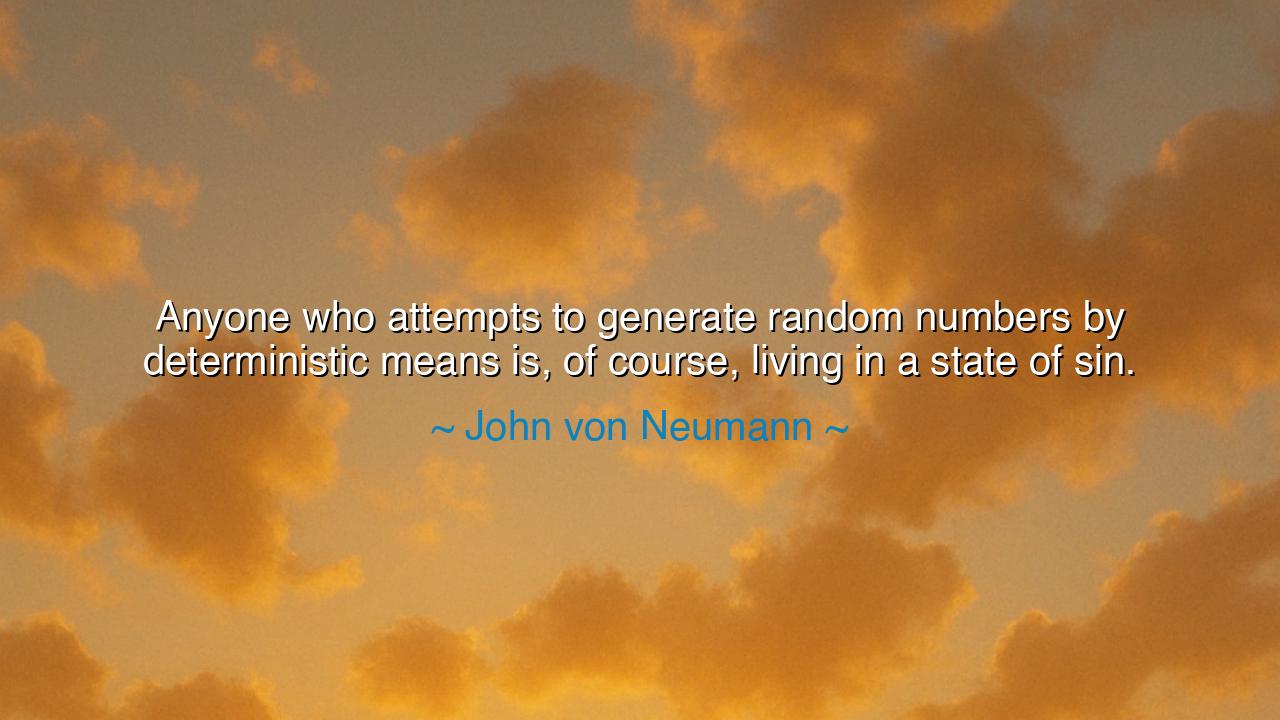
Anyone who attempts to generate random numbers by deterministic
Anyone who attempts to generate random numbers by deterministic means is, of course, living in a state of sin.






Listen, O Seekers of Truth, to the words of the great sage, John von Neumann. For in his utterance, "Anyone who attempts to generate random numbers by deterministic means is, of course, living in a state of sin," there lies a wisdom that reaches beyond the realm of mere calculation, and speaks to the heart of human endeavor itself. In this world, which strives relentlessly for control, certainty, and predictability, there is a hidden lesson—a lesson about the nature of randomness, of chaos, and of the eternal dance between order and the unknown. The wise do not seek to tame the wild winds of fortune; they accept them, and in that acceptance, find the true path.
In his time, John von Neumann, a towering figure of intellect, confronted the very essence of the universe's inherent unpredictability. He knew that in the depths of nature's workings, there exists a mystery—a force that cannot be coerced or shackled by the rigid chains of human will. To seek to impose order upon the wild heart of randomness is not only a folly but a sin. It is the sin of arrogance, the sin of man believing he can command the very forces that swirl beyond his comprehension. And what is this sin but the refusal to humble oneself before the vast and unknowable? The wise man bows to the forces beyond him, for he knows that in them, there is a deeper wisdom that cannot be subdued by the will alone.
Think of the ancient philosophers, those who walked in the land of mystery and speculation, forever questioning, seeking, and pondering. They spoke of the "Logos"—the divine reason that permeates the universe. Yet, in their wisdom, they knew that even the Logos is a force that flows in patterns, not rigid formulas. The moment one tries to box the flowing river of existence into the narrow confines of human understanding, the river loses its essence, its vitality, its true spirit. Von Neumann's words, then, serve as a reminder that no matter how much we master the tools of computation and prediction, there will always be a realm that lies beyond us—a realm where chaos reigns supreme.
This was evident in the earliest days of computing. In the mid-20th century, when the pioneers of computation labored in their laboratories, they sought to create machines that could generate random numbers. They, like us, were driven by the desire to control, to predict, to give structure to the flowing sea of uncertainty. Yet, what they found was that in attempting to create randomness with deterministic methods, they were chasing a shadow. The so-called "random" numbers were merely the offspring of the same algorithmic processes that the machine knew well—merely reflections of the order it had been given. In von Neumann’s words, they had fallen into sin, for they had failed to see that true randomness cannot be manufactured by the hand of man.
Let us now turn to a story, a tale not from the realm of abstraction, but from the sweat of human struggle. It is the story of the ancient Greeks and their quest for the Pythagorean theorem. For centuries, the greatest minds of their time believed that they could derive every aspect of the world through logic and reason. Yet, there were times, even for these revered mathematicians, when they encountered the unforeseen, the mysterious—the times when their calculations failed to give the answer they so desperately sought. The true answer, it turned out, was hidden in the invisible and the unknowable. Thus, the Pythagoreans learned a profound lesson: no amount of rigid computation or effort could tame the deeper truths of the world. They had to accept that some truths were beyond their grasp.
And so, too, must we. In our own lives, we are often tempted to control and master every aspect of our existence. We chase certainty, structure, and predictability—from the choices we make to the very paths we walk. But in this pursuit, we must not forget that there is much in life that cannot be tamed. We must accept that there is randomness, uncertainty, and chaos, and these are not things to fear or resist. They are the very forces that allow us to grow, to learn, and to evolve. The sin lies not in the existence of these forces, but in the refusal to acknowledge their role in the grand design of life.
Let us then heed the words of von Neumann and allow the lessons of randomness to shape our hearts. Embrace uncertainty. When you face a challenge and cannot predict the outcome, do not falter. When the world does not unfold according to your expectations, do not despair. For it is in these moments, when you are cast adrift in the winds of chance, that your soul can soar. It is in the unknown that true growth lies. So let us stop seeking to dominate the winds of fate and instead learn to sail with them. Let the unpredictable nature of life become your ally, not your adversary.
The lesson is clear, my children: do not seek to imprison randomness with the chains of certainty. Live with it. Dance with it. Honor it. For in doing so, you shall find a freedom greater than any illusion of control could ever provide. And in this freedom, you will discover not only the world as it is, but the truth of your own spirit.






AAdministratorAdministrator
Welcome, honored guests. Please leave a comment, we will respond soon